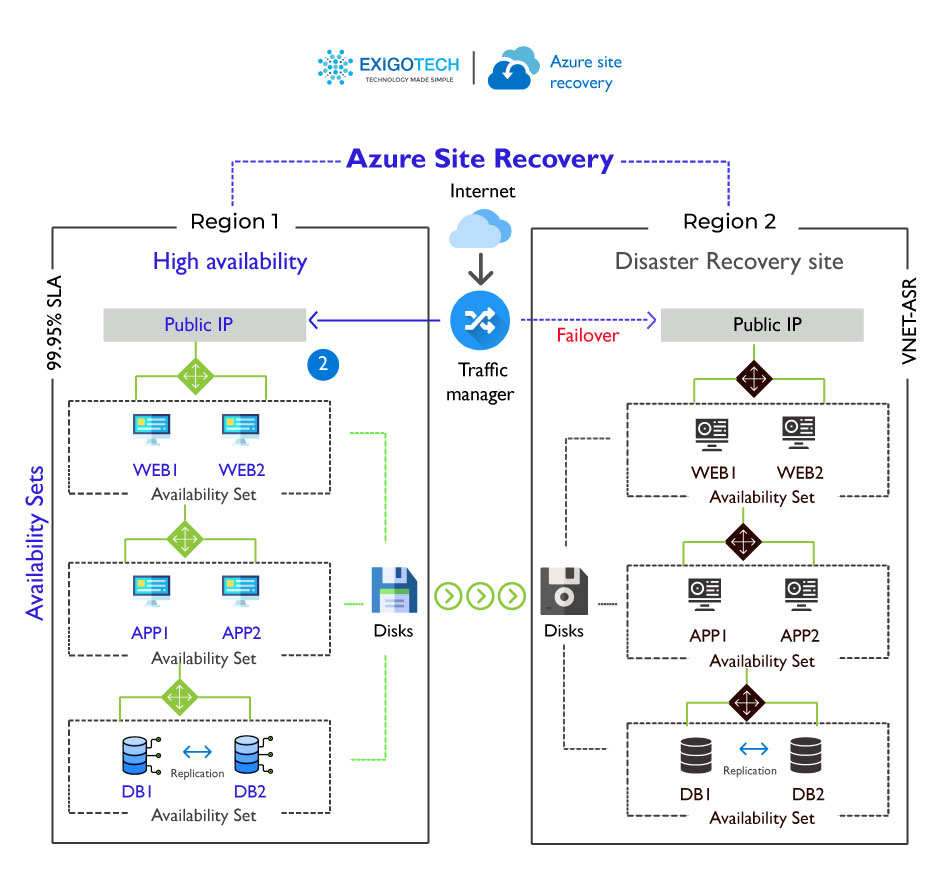Data safety and backup have no longer remained a choice. Businesses are required to partner with disaster recovery as a service (DRaaS) providers to ensure resiliency and continuity across their private, public or hybrid cloud environments. One of the major reasons for availability of business operations becoming an indispensable component is the sea wave of change and competition that has cropped up on the corporate landscape. Previously, businesses used to run their operations from a single data center that was designed for client/server architectures and mainframes. But the times have changed now. The companies have switched to a hybrid cloud environment to leverage its flexibility, agility and scalability. Also, the hybrid cloud is a reliable platform for technologies such as analytics, cognitive computing and mobile applications.
The main challenge of investing in a hybrid cloud infrastructure is that the workloads can emerge from any source. As a result of this, the IT professionals find it difficult to integrate, secure, manage and monitor it. And the traditional business continuity approaches might fail in a modern complicated setup. Therefore, businesses need to view their continuity plans from an altogether different lens. According to a survey by Enterprise Strategy Global, 35% of the companies prefer that the data recovery exercise should not take more than 15 minutes. However, when the group decided to measure this statistic against the real scenario, it was concluded that data backup alone is not sufficient. A broader approach that reduces dependency on the IT teams and includes taking a proactive route towards achieving resiliency and continuity is the ideal strategy.
Now, the question here is how enterprises can create a solid plan that minimises interdependencies, simplifies infrastructure management and allows them to keep achieving their set objectives in limited budget and time. The answer here is that professionals need to focus on building resiliency strategies while ensuring data security and confidentiality. This post will touch upon a few points such as –
- How are disaster recovery services and business resilience strategies related?
- What are the applications of Microsoft Azure Site Recovery (ASR) in your business environment?
- Why Microsoft Azure Site Recovery is a permanent fixture in our disaster recovery as a service strategy?
- Why Exigo Tech is your ideal disaster recovery as a service provider?
How are disaster recovery services and business resilience strategies related?
Business resiliency has become a watchword for modern organisations as the corporate landscape has grown to be more dynamic and is fraught with several uncertainties as well as the challenges of cyber security space. In a nutshell, business resilience is the organisation’s capability to keep running at its normal pace when it is hit by to an untoward man-made or natural incident. These strategies enable businesses to become impervious to any disruptions. Business resiliency is more about organisation’s strategies and plans to withstand and resist any issues and minimise their impact. Business continuity is often used interchangeably with business resiliency but there is a fine line of difference here. Business continuity stresses upon the measures to be taken after the disaster has occurred and business resiliency is all about staying afloat during the unfortunate incidents. However, there are some similarities between business continuity and business resiliency as these focus on uncertainties and these are closely related with the disaster recovery strategies.
Business Continuity and Disaster Recovery (BCDR) is a well-known term amongst business leaders. Motivations for developing a BCDR plan stem from the advantages that it offers – guaranteed availability of services and products, enhanced customer experiences and protected revenue streams. Many customers also prefer a business that has a continuity and disaster recovery plan in place. After clearing the why of BCDR, let’s move on to the when of this plan. There are several parameters that businesses are required to evaluate before they announce a disaster and take the BCDR actions. One of the prime reasons that businesses should be careful is that there are possibilities of interrupted operations when all the functionalities are switched from the main server to the backup one. Also, implementation of a BCDR plan incurs costs therefore, organisations need to be careful before enacting the plan. CIO (Chief Information Officer), CFO (Chief Finance Officer), CEO (Chief Executive Officer) and other abled C-executives should constitute a team to designate an event as a disaster and approve the next course of action.
There are several managed IT service providers in AU (Australia) who offer disaster recovery as a service solution. We specialise in delivering Veeam, Microsoft, VMWare, Datto and ArcServe. Contact us today to learn how we pick the best solution for you after understanding your business requirements and empower you to thrive through uneven times. Being a Microsoft Solutions Partner, in this post I will focus on Microsoft’s disaster recovery solution – Azure Site Recovery.
What are the applications of Microsoft Azure Site Recovery (ASR) in your business environment?
Microsoft Azure Site Recovery is a disaster recovery as a service solution offered by Azure that ensures data backup and safety. The software is used by the businesses to keep their data and applications functional during planned or unplanned outages. During an outage, the data fail over to the secondary location and you are able to access it, ensuring business continuity. It orchestrates and manages recovery for both physical servers and virtual machines. It can replicate data for multiple scenarios such as data on physical servers from primary or third-party location can be backed up in Microsoft Azure. Windows virtual machines (VMs) hosted in Amazon Web Services (AWS) cloud can be replicated in an Azure environment. The data stored on Windows and Linux VMs hosted in Hyper-V can be duplicated in Microsoft Azure. You can save the backup costs by leveraging from the pay as you go model of Microsoft Azure. After understanding the basic functionality of Microsoft Azure Disaster Recovery as a Service, let’s learn about its features and offerings.
- Simple BCDR Solution – Explore the ease of configuring and maintaining replication, backup and failover from a single spot in Microsoft Azure portal.
- Azure VM Replication – As the name explains itself, program disaster recovery for an Azure VM from a primary site to secondary location.
- VMWare VM Replication – Replicate VMWare virtual machine to Microsoft Azure to ensure better security controls and resiliency.
- Short RTO and RPO – Ensure quick recovery of the data as Microsoft ASR allows you to set RTO (Recovery Time Objective) and RPO (Recovery Point Objective) to the minimum value as suited to your business operations.
- Mock Drills – Conduct disaster recovery drills without causing any interruption to the on-going processes.
- Flexible Failovers – Run planned fail overs with zero data loss and unplanned fail overs with minimal data loss. You can always gain access to the lost data when your systems are shifted back to the primary site.
- Customised Recovery Plans – Use the recovery plan functionality to take back up of the data stored in multiple locations or virtual machines. You can also group the virtual machines as per your requirement or preference.
- Network Integration – Manage the network requirements of your applications as Microsoft ASR integrates with Azure Traffic Management and ensures proper and efficient network switchovers.
The above list sheds light on some of the main features of Microsoft ASR. There are many other offerings which makes Azure Site Recovery a preference of disaster recovery as a service providers in Australia. To learn why we –a leading managed IT service provider in AU, suggest ASR to businesses, read on.
Why Microsoft Azure Site Recovery solution is a permanent fixture of our disaster recovery as a service strategy?

It is certain that cookie cutter approaches are not ideal when we talk about disaster recovery plans. The primary reason is that every business is unique and so are its needs. But there is one common thing and that is every organisation needs a disaster recovery plan and it can’t afford to sideline fault tolerance and business continuity strategies. Azure Site Recovery is a suitable option when businesses want to switch to an efficient disaster recovery solution from their legacy architectures. It is designed to offer heightened levels of data security and confidentiality. Some of the other reasons are –
- Elimination of a secondary datacenter
With ASR, data gets backed up in an Azure environment and the need to build and maintain a secondary datacenter is negated. In case of a fail over, Azure virtual machines with the required data are automatically created.
- Easy deployment
As Azure Site Recovery is cloud-based, we are able to remove the hardware costs and deliver an effective disaster recovery solution to our clients. As a part of our disaster recovery as a service package, our customers are able to leverage our proven backup and replication strategies at affordable rates.
- Multiple virtual machines failover
With Azure Site Recovery at the center, we tailor recovery plans that include scripts and Azure automation runbooks. Using the plans, we take backups of data that is stored in multi-tiered applications.
- Compliance adherence
We understand that meeting compliance regulations is crucial for our clients. Microsoft’s disaster recovery solution is engineered to enable businesses to abide by the industry’s compliance requirements as it allows site recovery between multiple Azure regions. We do mock drills to evaluate compliance adherence and if businesses wish to add an extra layer, then encryption in transit and encryption at rest principles are applied.
- Integration with existing business continuity and disaster recovery plans
Microsoft ASR is compatible with several other technologies. As a result of which, we are able to build a cost-effective disaster recovery strategy by eliminating the migration, maintenance and training costs associated with building a new infrastructure from scratch.
- Application consistency
ASR is programmed to store in-memory data and transactions along with the disk data to ensure optimum application performance even during failovers.
Why Exigo Tech is your ideal disaster recovery as a service provider?
We received the Microsoft Top Gun partner status within six years of our inception and this achievement reinforces our commitment to offering only quality services to our clients. Apart from this, we are ISO 27001 certified, so you can rest assured about the security of your intellectual properties. Our engineers conduct reviews and evaluate technology development roadmaps to ensure that your organisation gets the best services and can navigate easily through the technological disruptions – unaffected. We have a team of experienced IT (Information Technology) engineers who are available 24/7/365 to assist you in case of any concern or query. To get in touch with an expert and get your business infrastructure secured by a leading disaster recovery as a service provider, call 1300 EXIGOTECH (394 468) or email .
 India
India Australia
Australia Singapore
Singapore Philippines
Philippines Niten Devalia | Oct 07, 2021
Niten Devalia | Oct 07, 2021










